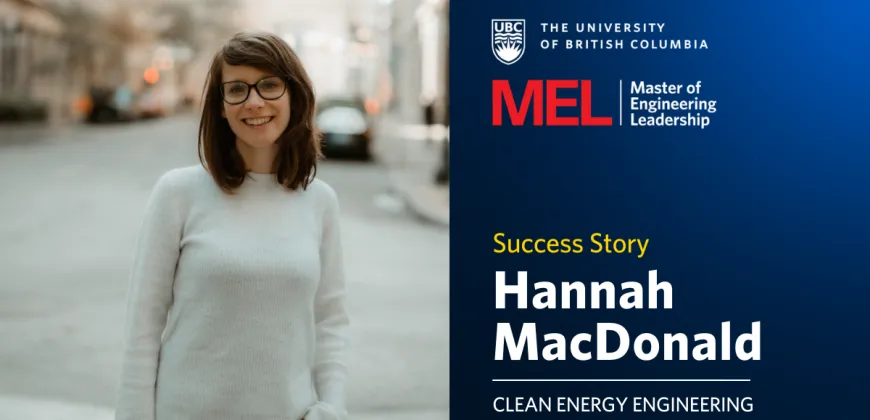Success Story: Hannah MacDonald
The unique interdisciplinary nature of the program made it very appealing to Hannah MacDonald, currently an analyst at Dunsky Energy + Climate Advisors, a firm that helps governments, utilities, private-sector companies and non-profits become more sustainable.

Organizations working in the clean energy space are challenged to find the multidisciplinary professionals they need – professionals who combine domain expertise with the project management, communication and leadership skills to successfully guide teams and oversee complex projects.
The UBC Master of Engineering Leadership (MEL) in Clean Energy Engineering was designed to address this need by bringing together graduate courses in engineering taught through UBC Faculty of Applied Science and courses on business and leadership taught through UBC Sauder’s Robert H. Lee Graduate School.
The unique interdisciplinary nature of the program made it very appealing to Hannah MacDonald, currently an analyst at Dunsky Energy + Climate Advisors, a firm that helps governments, utilities, private-sector companies and non-profits become more sustainable.
“We support organizations in their journey in the clean energy transition,” she says, explaining that the company focuses on the demand side of the energy equation by looking for ways to improve energy efficiency in buildings, assessing renewable energy solutions and transforming transportation through electrification.
Having worked in the environmental sector, including working for a consulting firm on site assessment and remediation, Hannah wanted to return to school to shift into the clean energy sector.
“You can do interesting and thoughtful cleanups of industrial sites,” she says, “but it would be wonderful if we didn’t have to do these cleanups after extracting energy. Renewables are a nice way to do that, and I saw this program as a way to dive deeper into this area and have a positive impact on climate change.”
Energy sector knowledge
Students in the program gain the technical skills to work in all areas of the clean energy sector – from renewable energy production and energy storage systems to demand-side solutions. This knowledge is attained through courses on thermodynamics, energy & the environment, energy storage & transmission, sustainable energy systems, energy policy, and energy efficiency and conservation. Students also complete a capstone project.
“You gain an understanding of how energy systems work and the technologies behind them,” says Hannah. “This gives you the foundational knowledge to be able to synthesize and translate that information to get meaningful action out of it. In my job I’m using knowledge gained from the program to assess available technologies as potential solutions for our clients. I understand how these technologies can work together with policies and programs to solve these complex challenges.”
Collaborative and effective leaders
Leading complex projects and managing interdisciplinary teams requires skills in project management, communication, change management and leadership.
Students in the MEL in Clean Energy Engineering learn these skills through business and leadership courses taught through UBC Sauder’s Robert H. Lee Graduate School.
They take classes on organizational leadership, strategy and innovation, sustainability and leadership, and data analytics andinterpretation. An intense four-week business boot camp introduces students to six core business competencies, from accounting and contract management to business case development, and students can also take an additional business course of their choosing.
For Hannah, the strategy and innovation course was a highlight. “We spent a lot of time looking at business and analysis frameworks, which led to exploring how to present information that is concise and accessible. That’s a really wonderful skill to have that you can use in every single presentation or report. You want to be able to synthesize complex information, highlight the most important takeaways and make sure your summary is interesting to read and actionable.”
Case studies, class discussions and group projects enable students to strengthen their skills in communication, collaboration, leadership and group dynamics.
“Working on teams effectively – no matter what your position – requires providing and receiving feedback effectively, being committed to transparency and taking a proactive approach to communication,” says Hannah.
“I recognize that Dunsky has put in place a lot of wonderful corporate culture practices, which definitely contributes to a positive workplace.”
The skills to make a difference
There is no understating the urgency with which our world needs to shift to new ways of generating and using energy. Fuelling that shift will be professionals like Hannah who have skills as both technical experts and leaders and communicators.
As Vladan Prodanovic, director of the program, states: “We strongly believe that future leaders in this sector must have a comprehensive understanding of the technical issues, but that this is not enough. They must be excellent communicators. They need to know how to listen to a community, and how to convey complex ideas to the general public, organizations and policy-makers. They need an understanding of business strategy and change management. Those who integrate this combination of skills are more likely to be successful in seeing the uptake and adoption of sustainable energy solutions.”
For Hannah, the MEL was the right program for acquiring these holistic skills and making a difference in the clean energy sector.
“To contribute to this field you need to know how energy systems work as a whole and understand the fundamental science and engineering behind the technologies. Equally important is being able to translate that complex information into understandable language. The transition to a low-carbon economy is exciting, but it is complex. And that means being able to understand the issues from multiple perspectives and clearly communicate the value of the changes and the risks associated with them. It’s this combination that can guide conversations in ways that lead to tangible actions.”
